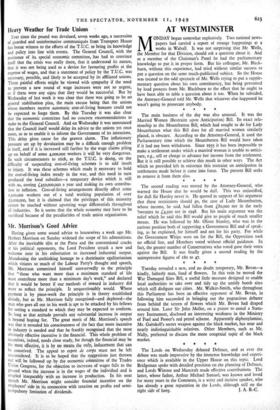Mr. Morrison's Good Advice
Having given some sound advice to housewives a week ago Mr. Herbert Morrison on Sunday widened the scope of his admonitions. After the inevitable tilts at the Press and the conventional cracks at his political opponents, the Lord President struck a new and welcome note in his exhortation to increased industrial output. Abandoning the unthinking homage to a doctrinaire egalitarianism which vitiates so much of the Labour Party's thought and speech, Mr. Morrison committed himself unreservedly to the principle that "those who want more than a minimum standard of life must contribute more than a minimum day's work," and declared that it would be better if our methods of reward in industry did more to reflect the principle. It unquestionably would. Where payment is by piece-work the principle is in theory established already, but as Mr. Morrison fully recognised—and deplored—the man who goes all out in his work is apt to be attacked by his fellows for setting a standard to which they may be expected to conform. So long as that attitude prevails any substantial increase in output is beyond hoping for. The great merit of Mr. Morrison's speech was that it revealed his consciousness of the fact that more incentive in industry is needed and that he frankly recognised that the most obviously effective incentive is the financial. This whole problem of incentives, indeed, needs close study, for though the financial may be the most effective, it is by no means the only, inducement that can be conceived. The appeal to esprit de corps must not be left unconsidered. It is to be hoped that the suggestions just thrown out will be followed up by the economic committee of the Trades Union Congress, for the objection to increases of wages falls to the ground when the increase is in the wages of the individual and is coupled inseparably with an increase in production. In his next speech Mr. Morrison might consider financial incentive on the employers' side in its connection with taxation on profits and semi- compulsory limitation of dividends.


































 Previous page
Previous page